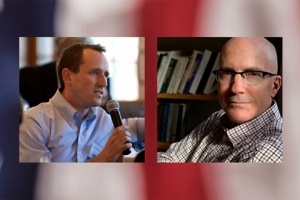Election Data and Science Lab Launches at Massachusetts Institute of Technology

Professor Charles Stewart III, Kenan Sahin Distinguished Professor of Political Science
Photo: Stuart Darsch
A new enterprise dedicated to researching and improving elections based on scientific principles launches today at the Massachusetts Institute of Technology (MIT).
The MIT Election Data and Science Lab (MEDSL) will generate, advance, and disseminate scientific knowledge in an effort to develop a comprehensive evidence base about the conduct of elections in order to improve their performance.
Founded by Charles Stewart III, Kenan Sahin Distinguished Professor of Political Science, the Lab will address multiple audiences of academic researchers, election practitioners, and the general public. It will serve a unique and independent role as it applies scientific principles to empirical questions about the administration of American elections.
“My hope for this Lab is that it will serve as an international, non-partisan resource for housing the expertise and evidence necessary to inform improvements of elections,” said Professor Stewart. “In the midst of a policy area that has become hyper-politicized, we hope to provide a counterbalance of hard evidence and analytical thinking. And, we look forward to bringing together communities in the election administration debate who often talk past each other, by offering an evidence-rich focal point of discussion.“
Major funding to launch the Lab comes from the William and Flora Hewlett Foundation through its Madison Initiative. “Our primary focus at the Madison Initiative is on improving Congress’ ability to deliberate, negotiate and compromise in ways that more Americans support,” said Jean Bordewich, program officer for the Madison Initiative. “At a fundamental level, the conduct of elections affects the experience of voters and people’s trust in American democracy. It’s imperative that we, as a nation, get this right and we believe that this Lab, under Professor Stewart’s leadership, can move us in the right direction.”
The work of MEDSL builds on more than a decade’s worth of work by Professor Stewart to promote the nonpartisan analysis of how election processes work, how they affect voters, and how they can be improved. Some of this work has been through the Caltech/MIT Voting Technology project, which will now be supported at MIT by the Lab. Other lab research anticipated in the near future includes assessing the overall performance of election administration in 2016, analyzing factors that reduce lines at polling places, and studying the confidence of voters in the election process.
One of MEDSL ‘s first project, “State Election Landscapes,” will entail the collection and dissemination of data on election administration in Midwestern states, thanks to support from The Joyce Foundation. This collaborative project will be managed by MIT and includes scholars from Ohio State University, the University of Minnesota and the University of Wisconsin.
This project will initially entail data gathering by researchers on campuses in Ohio, Minnesota, and Wisconsin followed up with dissemination, through publication of the enhanced data on an interactive website, release of state-specific reports that describe the electoral landscapes of the six Great Lakes states, and the holding of three public symposia that use these reports as a spur to discuss the future of elections in Ohio, Minnesota, and Wisconsin. This project will serve as a model for future work in a larger collection of states.
“We commend Professor Stewart and MIT on the launch of the Election Data and Science Lab,” said Beth Swanson, Vice President of Strategy and Programs at the Joyce Foundation. “Joyce supports efforts to ensure that the election administration process is fair and accessible for all voters, and the work of this new lab will generate the data necessary to make that possible.”
For more information on the Lab’s activities, please visit their website.

